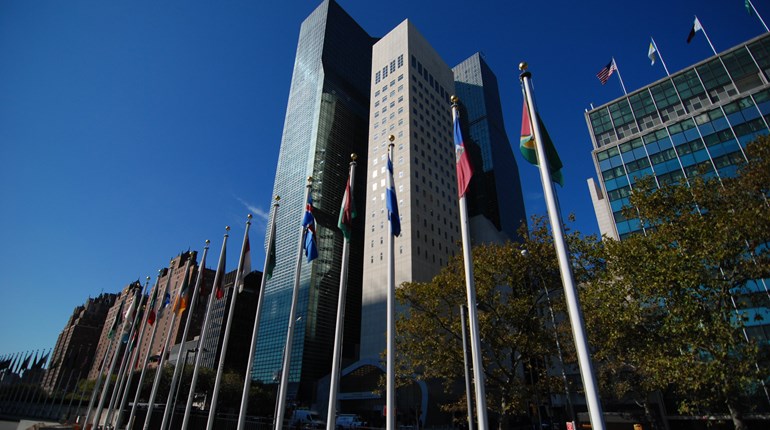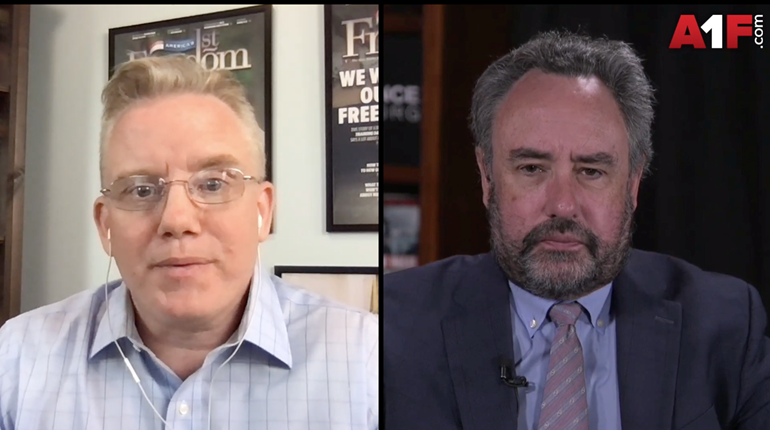
While the chances of ratification of the United Nations Arms Trade Treaty (ATT) are low in the current Senate, thanks largely to NRA activists in recent elections, the ATT is in effect among the 72 nations that have ratified it. With the collusion of the United Nations, the international gun-ban lobby has been setting up the official structures for a global campaign against gun owners. And they made important progress at the First Conference of States Parties to the ATT in Cancun, Mexico, in late August. In particular, they laid the foundation for a U.N. bureaucracy that can pursue its own agenda.
The ATT went into legal effect in Dec. 2014. The Cancun meeting was the first step toward creating the official U.N. office, a “secretariat,” to manage the Treaty. Preparatory meetings were held earlier in Mexico City, Berlin, Port of Spain, Vienna and Geneva. Putting a South African government official in charge of the ATT was an important step toward making the Treaty into a tool for the U.N.’s global war on gun owners.
The first objective of gun prohibitionists and the U.N. bureaucracy was to keep the National Rifle Association from observing what was going on. Non-government organizations (NGOs) are often allowed to participate in U.N. meetings, after passing through a process to be formally recognized by the U.N.; the NRA has done so.
During the initial preparatory meetings for the Cancun conference, the U.N. excluded the NRA, The Heritage Foundation, and firearm industry representatives. The meetings were open only to NGOs that “actively supported” the Treaty, not to critics.
In response to the exclusion of NRA, Heritage, industry and other organizations, U.S. Rep. Mike Kelly, R-Pa., sent a letter of protest to President Barack Obama. The U.S. State Department, to its credit, boycotted the Berlin prep meeting to protest the exclusions. As a result, subsequent meetings were opened to all sides, as was the formal conference in Cancun.
What did the Cancun conference actually accomplish? For one, delegates chose the first secretariat of the Arms Trade Treaty office, Simon D. Dladla, director of Conventional Arms Control under the South African Department of Defence. South Africa is a perfect example of the hypocrisy of the United Nations in general, and the ATT in particular. South Africa has strong laws—much stronger than the Treaty—against exporting arms to governments that violate human rights. Yet the South African government actively participates in arms smuggling to the worst human rights abusers, such as the genocidal regime of Robert Mugabe in Zimbabwe. At the United Nations, South Africa is a major player, and it uses its influence to protect the world’s most notorious regimes, such as the military dictatorship in Burma.
At home, South Africa’s repressive Firearms Control Act is enforced with special stringency against blacks and women, leaving them defenseless in a nation with very high rates of murder and other violent crime. Putting a South African government official in charge of the ATT was an important step toward making the Treaty into a tool for the U.N.’s global war on gun owners.
The Cancun conference chose Geneva to be the headquarters for the ATT secretariat. Geneva is second only to New York City for the number of U.N. offices. Among those offices are the U.N. Conference on Disarmament and the U.N. Institute for Disarmament Research. Numerous NGOs focused on disarmament are also headquartered there. The University of Geneva is home to the Small Arms Survey, the world’s leading research organization for gun control. In fact, Geneva is the global capital of disarmament. In Geneva, the ATT secretariat will be in the orbit of the larger, and better-funded, disarmament organizations. Over time, this will likely pull the ATT in the direction of becoming an international law basis for disarming citizens, rather than just for restricting arms sales to human rights abusers.
One of the big questions was the role of the new ATT secretariat. Will the secretariat be just administrative, such as collecting national reports and publishing the ones that are not confidential? Or will the secretariat be a global leader in proposing new gun control rules, which supposedly should be followed as a matter of international law? The U.S. State Department delegation, to its credit, favored only the former, limited role.
But the president of the conference, a representative from Mexico, in an unusually sleazy parliamentary maneuver, departed from the agenda and managed to lay the foundation for a powerful, aggressive secretariat. The draft final report of the conference says that it was “suggested by the president” that the secretariat have the power of “collating best practice on the implementation and operation of the Treaty,” and “identifying lessons learnt and need for adjustments in implementation.” Although the language is bland, this was an important step toward Secretariat Dladla and his successors being able to proclaim global gun control law.Do people have the human right to defend themselves against ordinary criminals, and against criminal governments, such as perpetrators of genocide? The U.N. says “no.” The NRA says “yes.”
Heritage Foundation scholar Ted Bromund attended the Cancun conference. As he explained in an August series of articles for The Weekly Standard, the premise of the Treaty is that governments supplying arms to human rights violators will transparently disclose this fact on their ATT reports, and that they will choose to make the reports publicly available—even though the ATT expressly allows the reports to be filed confidentially. Then, theoretically, people will criticize the arms-dealing governments, and those governments will simply stop illegally selling arms.
This theory might work if all the governments in the world were democracies that were committed to transparency. For example, long before the United Nations got involved in gun control, the United States adopted the most stringent system in the world for the public reporting of arms exports. Consequently, the United States has never needed the ATT. To the extent that any other government was serious about export controls, that government could just adopt parallel versions of the U.S. laws. Of course, as South Africa shows, having good laws does not necessarily mean that the government will obey them.
But nations like Russia and China—major weapons sources for human rights violators—have not signed the ATT. At international conferences, they claim to have strong ethical standards about their exports, but everyone knows this is a lie. In fact, China boldly stated at the conference that only a treaty adopted by consensus can be universally implemented, and further, that China never transfers arms to non-state actors.
The pro-disarmament NGOs, meanwhile, produce enormous quantities of reports and speeches about the genuine problems of arms in the hands of African warlords, Middle Eastern combatants in civil wars, and so on. But the NGOs are extremely timid about criticizing Russia, China, Iran and similar nations for supplying those arms. Just about the only way for a country to get directly criticized at a U.N. gun control conference is for that country to be an ally of the United States.
For everybody else, a double standard applies. Bromund reports a conference rumor that the leading international anti-gun lobby, Control Arms, paid for a number of African government delegates to attend Cancun. But some of those delegates were not able to go—they could not transit the United States, as they are on U.S. sanctions lists that prohibit identified human rights violators from entering the United States. This is one example of how the international anti-gun lobby is more interested in confiscating guns than in promoting human rights.
In a “side event” at Cancun, the governments of Mexico, Belgium, Germany and the United Kingdom held a party for the release of a new book, Weapons and International Law: The Arms Trade Treaty. The book takes the position that self-defense is not “an individual human right that can be commonly exercised.” That is truly the fundamental issue in the debate about U.N. gun control: Do people have the human right to defend themselves against ordinary criminals, and against criminal governments, such as perpetrators of genocide? The U.N. says “no.” The NRA says “yes.”
This fight is going to continue for some time. The next Conference of States Parties will be held in Geneva in the latter half of 2016, where gun prohibitionists will continue to build up the ATT and its secretariat as instruments of global gun bans.


































